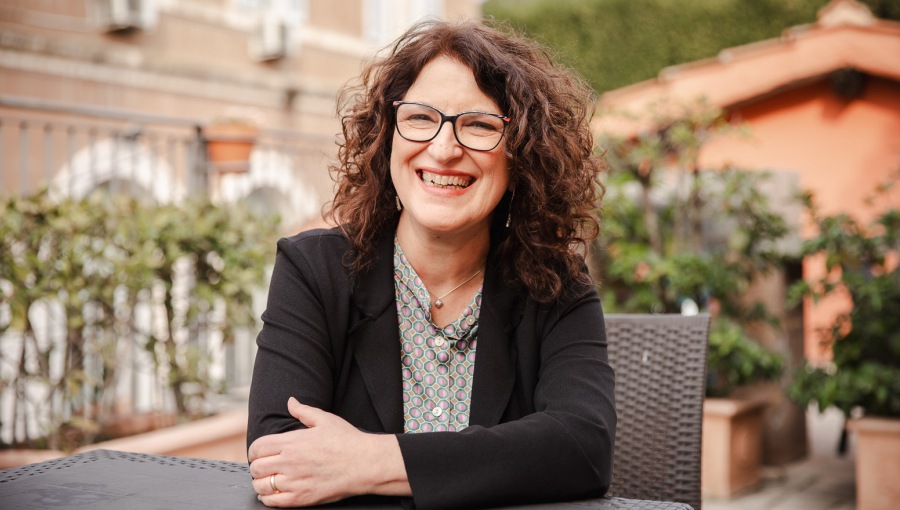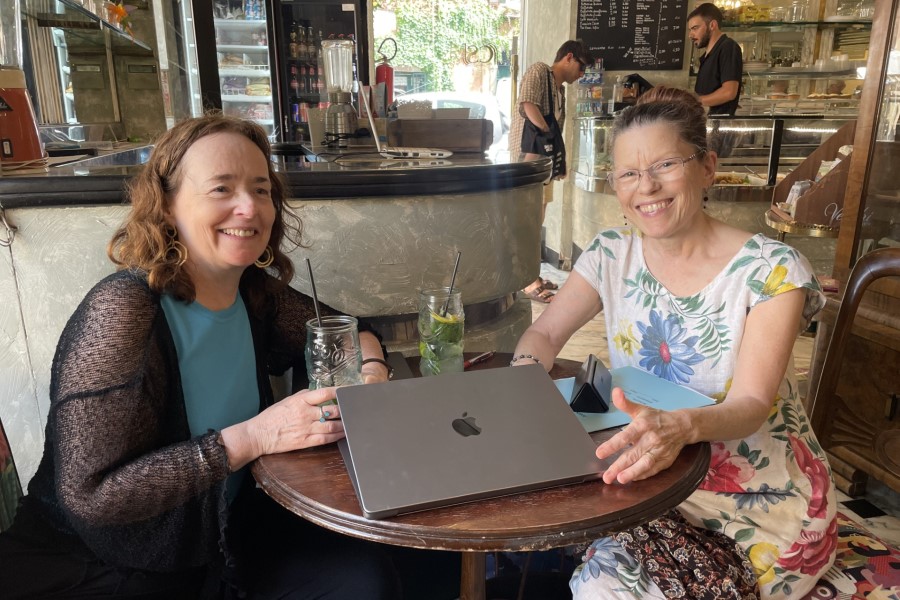Professor Anna Mauceri Trimnell Edits Poetry Collection
Professor of Italian Anna Mauceri Trimnell recently edited Jolanda Insana. A schiere le parole (Jolanda Insana. In Ranks the Words, Marcos y Marcos 2024), a collection (in Italian) of selected poems as well as previously unpublished poetry and prose by Jolanda Insana (1937 – 2016). Born in Sicily, Insana lived most of her life in Rome and is considered one of Italy’s most important modern poets. The book was presented on January 31 at the Franco Parenti Theater in Milan.
How did the idea for this project come about?
After her official debut in 1977 with Sciarra amara, Jolanda Insana composed numerous collections of poetry. In 2007, her poetic works were compiled in an anthology by the publisher Garzanti, followed by several more titles including the posthumous volume in 2017, Cronologia delle lesioni, published by Sossella editore. After that, none of her books were available in bookstores. Sensing the void created by the absence of one of the most original voices in the Italian literary landscape, publisher Marcos y Marcos, with Fabio Pusterla as the director of their poetry series “Le Ali,” and Maria Antonietta Grignani, a scholar of Insana, proposed that I oversee the edition.

I had been in contact with Jolanda Insana during the last 16 years of her life. I was working with her on organizing her rich archive of unpublished texts to add to the collection she was working on when she passed away. The editors and I thus decided to include alongside the selection of published texts, a number of unpublished and rare texts: both prose and poetry. We also included some of her latest compositions, reproduced in their final form, with the notes, doubts, and lexical variants written in the margins by the author, to testify to the complex process of elaboration. This process has marked, from the beginning, the writing practice of a poet always open to the variety of language and to the schiere di parole (ranks of words) in rendering the complexity of reality.
What were the challenges and rewards of working on this book?
Undoubtedly, the greatest difficulty was in choosing the texts, especially those that were previously unpublished. She was a poet with an extremely complex personality, with a myriad of interests; and in constructing the anthology, I sometimes felt as if I were leaving something indispensable behind: translations of classics, epigrams, reflections on language, and texts predating 1977. But ultimately, the length of the collection is what seems to me to be its strength: it is a volume that aims to present a powerful voice and is intended for readers who are both familiar with Insana’s poetry and those who are encountering her for the first time.
How would you describe Jolanda Insana’s work?
Insana’s work can be defined in two words: contemporary and necessary. Her poetry stands powerfully against the violence and troubles of contemporary society, as well as against the hypocrisies, falsehoods, and conventionalism in personal relationships. It is essentially a poetry proud of its civil choice, expressed through harsh language, far removed from the Italian lyrical tradition. Her poems are all characterized by intense energy, created through meticulous work ranging from ancient forms to dialects and contemporary stereotypes, from spoken language to the terminology of, for example, medicine, botany, and agriculture.
Tell us about the book presentation at the Franco Parenti Theater in Milan.
The publisher Marcos y Marcos decided to go beyond the traditional presentation format and organized an evening of tribute to Insana and her writing. A selection of prose and poetry texts were read by the actress Carolina Leporatti, interspersed with personal stories and reflections on Insana’s poetry, shared by myself, Maria Antonietta Grignani (who wrote the anthology’s preface), and Fabio Pusterla and Massimo Gezzi (editors of the poetry series).
In 2007 Insana was a guest at John Cabot University, where she met with students from an Italian literature class and answered their questions about her poetry. In 2008, she participated in InVerse – Italian Poets in Translation, the festival of Italian poetry in translation founded in 2005 by JCU Professors Brunella Antomarini, Berenice Cocciolillo, and Rosa Filardi.
The poems read and translated for that occasion appear in the volume InVerse Italian Poets in Translation 2008-2009, published in 2011 by John Cabot University Press.
I would like to conclude with one of them, translated by JCU Professor Berenice Cocciolillo.
Coltellate di bellezza
alla poesia non c’è rimedio
chi ce l’ha se la gratta come rogna
eppure il poeta sfortunato
o s’impicca o è martoriato
e di te diranno
è morto e va cantando
m’arrocco e non mi scastro
dove il pane è più salato
e lascio la melassa alle formìcole
quand’è il caso
mi calo la visiera
e do coltellate di bellezza
Stabs of Beauty
there’s no cure for poetry
if you get it you scratch it like scabies
and yet the unfortunate poet
either hangs himself or is tormented
and they will say about you
he’s dead yet he sings his poetry
I barricade myself and won’t get out
where the bread is saltier
and I leave the molasses to the ants
when the time is right
I put down my visor
and take stabs of beauty
Professor Mauceri earned her laurea in Lettere degree from the University of Pavia and received her doctorate in Linguistics and Pedagogy of Italian as a Second Language at the University for Foreigners of Siena. Her research has been primarily on Italian literature in the 20th and 21st centuries, with a focus on its relationship to linguistics. At John Cabot she teaches Italian literature, Italian language, and sociolinguistics.





